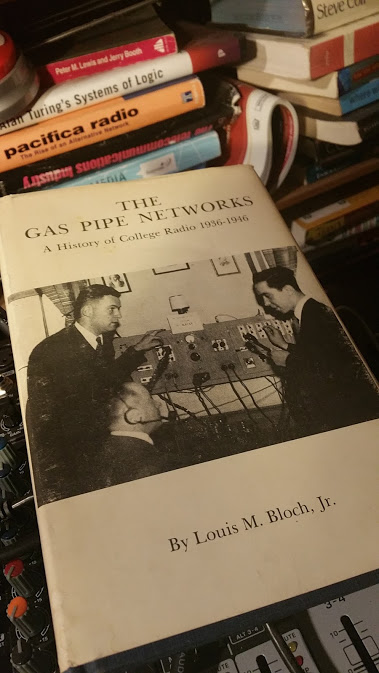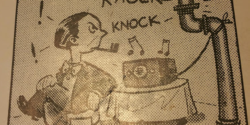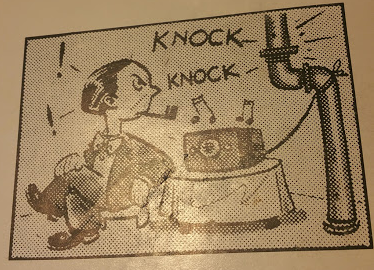I own a lot of books about the history of radio. Unique among them is Louis M. Bloch Jr.’s charming and strange volume titled The Gas Pipe Networks: A History of College Radio, 1936-1946. Every now and then I open its pages and am transported to a distant world of struggling collegiate stations. The tome chronicles lads and lasses from Harvard, Columbia, Swarthmore, and Wellesley—all heroically trying to make their broadcast operations work. The graphic on the back cover says it all.
The Great Depression? Hitler? Oh piddle. This fine stout fellow just wants to sport his bow tie, smoke his pipe, and listen to his beloved college signal. Who can fault him for such?
But at various points in the book, the real world suddenly jumps in. I refer to chapter VII, “The first years of the war,” in which the author lived at International House in New York City for a spell. Now Bloch has some fun stories to share.
Here’s one about the folk singer Burl Ives:
“Burl Ives had moved into International House several years before my arrival . . . It seems that every evening about nine o’clock a long black object passed the windows of the rooms on the girl’s floors on its way to the roof. Some of the girls were terrified until the mystery was solved. It seems that Burl Ives was pulling his sleeping bag to the roof each night and sleeping there.”
Then there was a dramatic Halloween reenactment of the Battle of London:
In October of 1941 I decided to join the British group and played the part of a London bobbie during a London blitz. We had actual recordings of an air raid with the bombs dropping and the sirens screeching. Ours was a dramatic production which shook the building.
Through the chapter celebrities come and go: Eleanor Roosevelt, some United States Senators, even future iconic radio historian Eric Barnouw. Then comes this sober paragraph:
When war was declared, all Japanese were rounded up and taken to internment camps. Among those taken from International House was a Japanese girl who was a friend to all. That was a really sad day.
 Indeed. Not surprisingly, Bloch and his buddies managed to install a two watt radio station on the premises named WOLF – “The Voice of International House.”
Indeed. Not surprisingly, Bloch and his buddies managed to install a two watt radio station on the premises named WOLF – “The Voice of International House.”
The location of the station was secret, and the staff was alarmed and helpless. They were convinced that the programs with mixed sexes must be originating from one of the rooms. They made a thorough search of the common rooms and then secretly made a search of the entire building without finding a trace of the station . . .
Jolly good fun . . . happy octogenarian birthday year, Gas Pipers!




